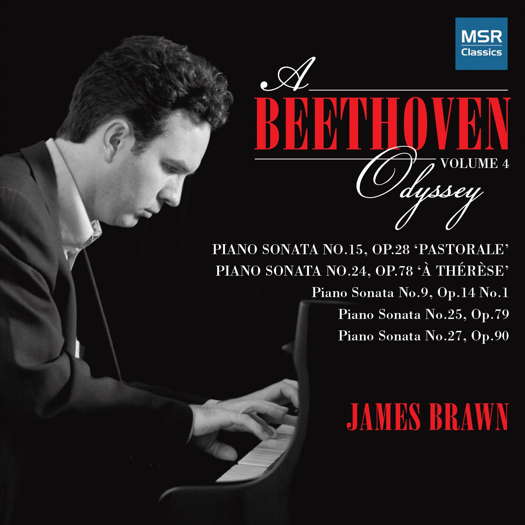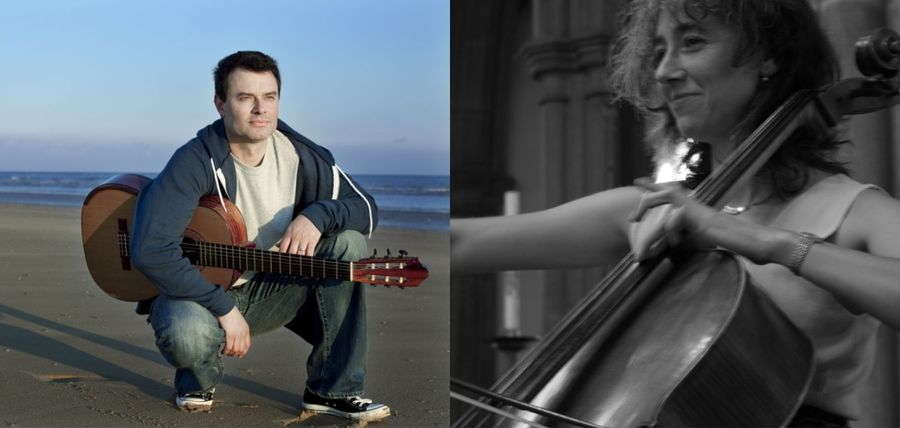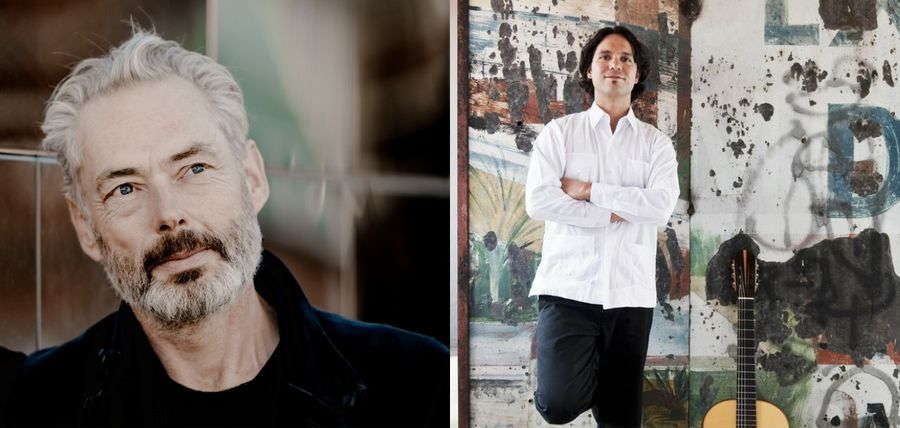- Byrd
- Roussel
- Karl Jenkins
- Daniel Sampaio
- Costa Rica
- Randall Thompson
- Paul Macalindin
- Opera Australia
 SPONSORED: CD Spotlight. Pure Magic - James Brawn's continued Beethoven Odyssey, awaited by Andrew Schartmann.
SPONSORED: CD Spotlight. Pure Magic - James Brawn's continued Beethoven Odyssey, awaited by Andrew Schartmann.
All sponsored features >>
ARTICLES BEING VIEWED NOW:
- Firedove - English organist Anna Lapwood's new album was recorded in a Norwegian cathedral
- Music on the Front Line - Peter King discusses the special place that music has for journalists at the sharp end of conflict zones
- A Worthy Captain - Peter King marks BBC presenter Petroc Trelawny's move from dawn to twilight
- United States of America
- United Kingdom
Quietly Compelling
Two Buxton Festival concerts involving the guitar, reviewed by MIKE WHEELER
The ensemble of guitar and cello is a relatively new arrival, as Craig Ogden said in his introduction. But while the bespoke repertoire is still a little thin on the ground, there are plenty of transcriptions to supplement it, giving plenty for him and Helen Thatcher to get their teeth into – Pavilion Arts Centre, Buxton, UK, 11 July 2021.
In Joaquín Nin's Suite Espanole they found a melancholy side to the opening slow dance, and an assertive flourish to launch the lively jota that follows. They brought stateliness to the third movement, and a gutsy rhythmic drive to the flamenco-like last piece.
Bolivian composer Jaime Zenamon and Brazilian Radamés Gnattali, names new to me, sounded well worth exploring. Zenamon's Reflexoes No 6 switches from incisive to moody and back, often exploring the cello's plangent upper register. Gnattali's Sonata for cello and guitar was full of fascinating detail, and in the second of the three movements took us into a secretive place with the cello muted.

Craig Ogden and Helen Thatcher
Incidentally, both Ogden and Thatcher could give lessons in how to address an audience to quite a few of their colleagues. Ogden is a great one for letting us in on his trade secrets. On this occasion it was how to mark up repeats directly onto a tablet – he held it up to show us – so that your eyes don't inadvertently go back to the wrong place. Thatcher told us about transferring guitar pizzicato techniques to the cello in the Gnattali sonata.
The transcriptions began with 'Andaluza', from Granados' Spanish Dances. Ogden and Thatcher drew you deep inside with playing that mixed the vigorous and the reflective. Then came a double helping of Piazzolla. 'Cafe 1930', from Histoire du Tango, was both laid-back and soulful, while Libertango was brimful of foot-tapping energy.
Put a lyric tenor of a certain kind together with a guitarist, and the chances are that sooner or later thoughts will start turning to John Dowland's lute songs. Mark Padmore and Morgan Szymansky began their recital with three of them – St John's Church, Buxton, UK, 11 July 2021.
'Come, ye heavy states of night' saw Padmore producing some finely focused tone. In 'Come again, sweet love doth now invite', one of the composer's best-known songs, there was a vein of anxiety underneath the playfulness, with an effectively hushed start to the last verse. Voice and guitar created a particularly intimate feel in 'Now, O now I needs must part' (also known, in its instrumental guise, as The Frog Galliard). That there was no need for grandstanding from either performer was also demonstrated in the inward musings of two Schubert night-scapes: 'Nachtstück' and 'Nacht und Träume'.

Mark Padmore and Morgan Szymansky
Between the Dowland and Schubert they performed two songs from Stephen McNeff's Eden Rock, four settings of poems by Charles Causley. 'A Certain Man' re-tells the Good Samaritan story from the victim's point of view, with both performers creating some vivid scene-setting, including apt percussive effects on the guitar. They gave a mesmerising account of 'Eden Rock', Causley's touching memories of family occasions in his childhood.
Alec Roth's song-cycle A Road Less Travelled is substantial in both its duration and its expressive reach. It sets words selected from poems by Edward Thomas, centring on images of roads and the natural world, with the First World War as an unspoken, shadowy backdrop. (Thomas was killed in 1917.) It calls for expressive intensity of a paradoxically understated kind, and Padmore and Szymanski drew us further and further into Thomas' and Roth's world. Rain is a recurring presence, evoked by Szymanski softly clicking his fingernails on the body of the guitar. So, too, is the imagery of dead animals, whose significance does not need underlining. There are three of them in 'The Gallows'; tenor and guitarist explored the song's latent anger without needing to hammer it home, except for the savage denunciation of the guitar's sign-off gesture. In the concluding 'Lights Out' - 'I have come to the borders of sleep' - Padmore's most hushed tone was quietly compelling, as was Szymanski's controlled fade-out at the end.
Copyright © 21 July 2021
Mike Wheeler,
Derby UK

MORE UK CLASSICAL MUSIC ARTICLES


